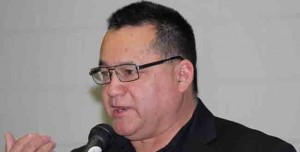New slogan minted at Anishinabek Education Symposium: Say ‘Yes’ to the AES!

UOI OFFICES (Nipissing First Nation) – The draft education self-government agreement between the Anishinabek Nation and Canada got an in-depth review by First Nation leaders and educators at the Anishinabek Nation’s education symposium held at Nbisiing Secondary School in Nipissing First Nation, April 23 -24.
In his remarks, Grand Council Chief Patrick Madahbee said, “We are at a time when we must move forward to take charge of the education of our children. Our education system is designed for success on our terms and under our jurisdiction. It has been designed by Anishinabek parents, Elders, and education experts. We’ve had the inspiration, done the perspiration, now we need implementation. We will soon be asking for First Nation resolutions to approve initialling of the education agreement and getting discussions going at the community level to prepare for ratification votes.”
The recognition by Canada of the Anishinabek First Nations’ jurisdiction over primary, elementary and secondary education, and the funding to operate the Anishinabek Education System (AES), a stand-alone, parallel, education system, is the prime purpose of the draft education self-government agreement with Canada.
Deputy Grand Council Chief Glen Hare said, “More than ever, we have to be together. We have a responsibility to shape our future. No one can teach us our language but us.” Chief Isadore Day of Serpent River, and Chairperson of the Chiefs Committee on Governance, struck a chord with “Say ‘Yes’ to the AES!”, a refrain often echoed during the symposium.
Murray Pridham and Dolly Hos, Canada’s education negotiators, gave Canada’s perspective on the Anishinabek Nation Education Agreement (ANEA), Canada’s fiscal offer, and the self-government legislative framework. Joanne Wilkinson, Director General from Education Branch, Aboriginal Affairs and Northern Development Canada , spoke on Bill C-33, the proposed First Nations Control of First Nations Education Act (FNCFNEA) and its potential impact on the Anishinabek Nation Education Agreement. First Nations operating under education self-government agreements will be exempt from the FNCFNEA.
Chiefs were highly critical of the FNCFNEA as being more about the Minister keeping control of First Nation education but off-loading federal liability to First Nations with status quo underfunding. The FNCFNEA was perceived as an attack on First Nations’ jurisdiction and a threat to First Nation schools.
Canada’s education fiscal offer was also criticized for not meeting the funding needs of Anishinabek First Nations, particularly those with on-reserve schools. Further criticism was levelled at Canada for not being transparent and not disclosing its methodology in arriving at the funding levels in the fiscal offer.
The two-day symposium followed a well-attended technical briefing during the evening of April 22, at the Anishinabek Nation head office. The education symposium boasted record attendance with 175 representatives from 33 of 39 Anishinabek First Nation communities registered, including Elders, elected Chiefs and councillors, education directors, principals, teachers, the Anishinabek Nation Women’s Council and Youth Council. Among other official delegates was the Kinomaadswin Education Body (KEB), a First Nation representative Board of Directors, who updated on recent discussions on the governance model of the Anishinabek Education System (AES).
In June 2013, the Anishinabek Nation Grand Council directed the establishment of the AES ahead of approval of the negotiated agreement to ensure the AES would be a turn-key operation on April 2016, the planned effective date of the Anishinabek Nation Education Agreement (ANEA). Included in the strategic plan to establish the AES is negotiations with Ontario, regarding practical arrangements for cooperation and student transfers between the provincial and Anishinabek education systems.
Restoration of Jurisdiction Director, Mike Restoule, and Anishinabek Nation Education Negotiator, Tracey O’Donnell, agreed that the education symposium met its objectives to get express direction for next steps for leadership and the negotiation team, to update on the strategic plan to implement the AES, and to achieve clarity on the proposed, federal FNCFNEA. The FNCFNEA had been called a “distraction” by Grand Council Chief Patrick Madahbee when it was first announced.
Negotiation of the Anishinabek Nation Education Agreement continues and initialling by negotiators is expected to take place at the November 2014 Special Assembly. In the meantime, community information sessions are proceeding.


